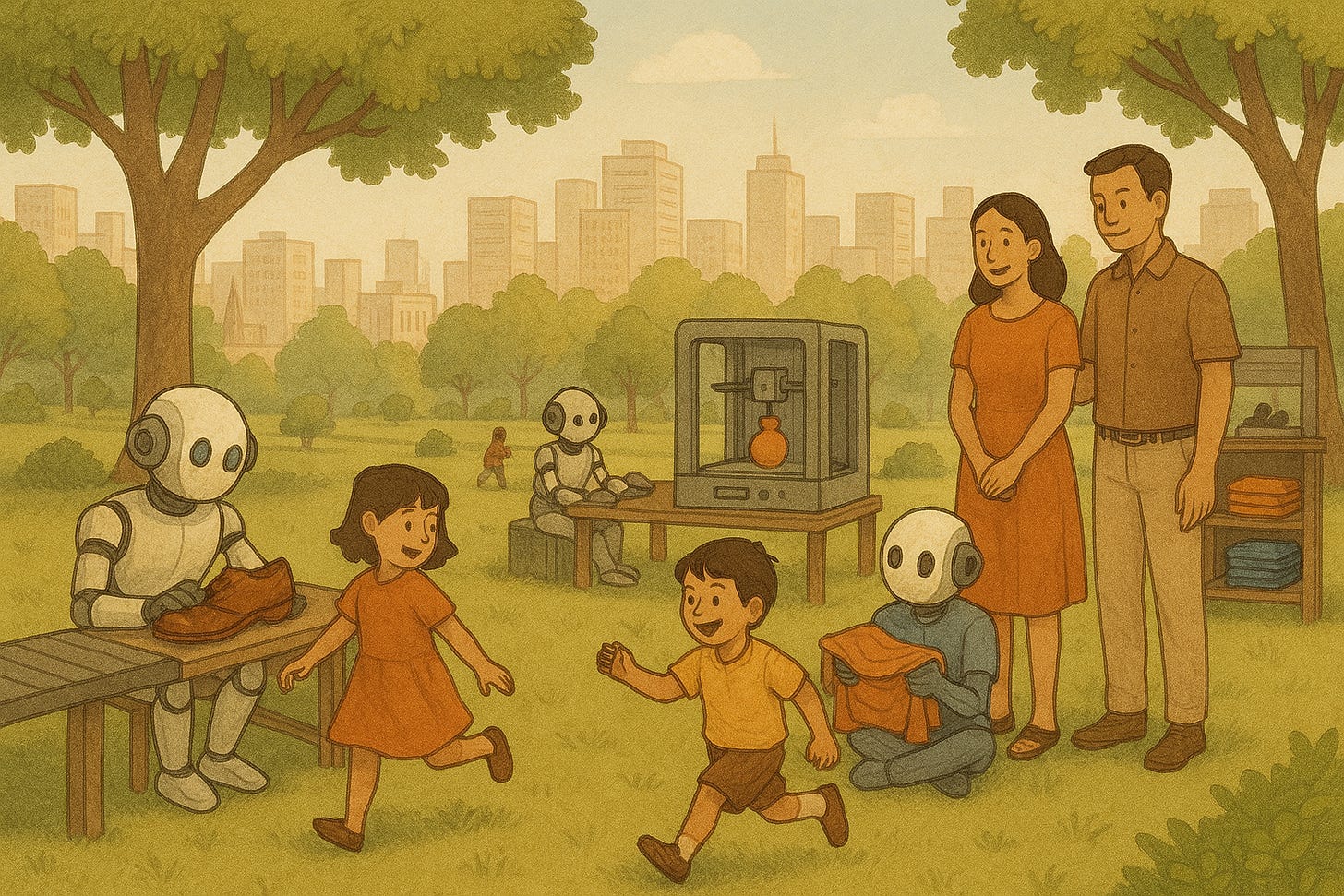AI will take our jobs, but our kids will be happy
How AI and GenZ may destroy "industrial economy" and create a decentralised economy
We have all imagined a scary future where corporations practically fire all humans and use AI agents to deliver services.
A variant of this is truly possible. And this possibility scares everyone - all experts, pundits, economists, and historians have been discussing this.
This stems from a flawed understanding of the Economic History of humanity and is far from what is most likely to happen.
Loss of jobs = Millions of Small Businesses
AI may destroy jobs, but it will not, and can not, destroy economic activity.
I think the primary source of economic activity will shift to small businesses with 1-5 people, and away from large corporations employing tens of thousands of people.
With millions of job losses, millions of humans will set up millions of small businesses. Gen Z even seems to prefer this to a corporate job!
These businesses will be owned by people with expertise in the product, instead of administrators. For example, if you are a shoe designer, you may set up a small manufacturing, run by a robotic machine. You will not need “suits” to run it for you.
The real casualties will probably be MBAs.
And this is scary because ..
We do not have a historical example of an economic system driven by small businesses, yet prosperous.
Experts study European history and conclude that an economy run by a group of small businesses (read medieval Europe) is synonymous with poverty and plague. For the West, prosperity (and good social indicators) came with Industrialisation, which also led to large corporations with few owners and many employees.
The Industrial Economic model of society eventually leads to the concentration of wealth in a few hands. That’s obvious. Wealth is gained by the owners of “value creation”. If there are just a few owners of value creation, wealth will be gained by just these few.
This is beautifully explained in the works of economist Thomas Piketty, culmiating in a simple, powerful statement “Capital outperforms labor”.
However, medieval India and China were prosperous but not industrial in the modern sense. It is noteworthy that both of these countries were manufacturing behemoths.
In prosperous, non-industrial economies, networks of small businesses drove almost all economic activity and wealth creation. I think this is the future AI will create.
Questions are -
Why the economists are not seeing this?
How will this happen?
Why will our kids be happier?
Why are the economists not seeing this?
Because experts only look at the economic history of Europe.
The economic history of Asia is not very well understood. To drive this point home, let’s take an example.
Example
If you were to take a guess, where do you think the following institutions originated - banks, bank notes and corporations.
Even if you run a Google search on these, you will end up in Denmark or Portugal. Not totally wrong (the “current forms” were indeed founded in Europe).
What is totally overlooked is that India had a bustling network of “trade guilds” that were well-organised corporations, and operated like banks. For example, they took cash deposits, issued banknotes, and gave debt to people and even kingdoms.
To what extent this constitutes banking can be debated. And I gladly leave that to the experts.
But my larger point stands.
As this piece of history is practically missing, our understanding of how the economy shapes society is incomplete. Specifically, we do not know how a non-industrial society can be prosperous.
How will this change happen?
The next question is, why was medieval Europe poor while medieval Asia was rich? If we can have, whatever medieval Asia had, we can also be rich while being non-industrial.
And the answer is simple - resources.
The pre-industrial world was heavily dependent on fertile soil, wood, and iron to operate. And all of these were limited in Europe compared to India and Han China.
Today’s resources are electricity, the internet and mostly the capability to develop new stuff.
Most small businesses have, or will have, access to these.
I expect that as people start losing jobs, we will start regrouping into small businesses and start delivering niche services. This pattern is already visible in the US (see video below).
As technology has improved business efficiency leading to job losses, people are starting businesses. These businesses will gradually take market share away from corporations leading to more job cuts. This cycle will continue until we reach a certain equilibrium.
Why will our kids be happier?
Because this will lead to a far more equitable distribution of wealth.
Let me explain.
In a world dominated by small businesses, there are more equity owners. For example, a corporation with 10,000 employees may be owned just by 100 owners. The top 1%, in this case, owns the entire wealth of this company.
If this breaks into 2000 small businesses each with 5 employees, we now have 2000 owners - a 20x increase in the number of people who own equity. Now the wealth is owned by 20% instead of the top 1%.
This is far more equitable and leads to a more efficient economy.
Many studies have explored how inequality and the decline of small businesses are related. And the reverse - a rise in small businesses reduces income inequality.
Conclusion
Every new technology re-shapes society. Don’t be scared. Prepare for it.





